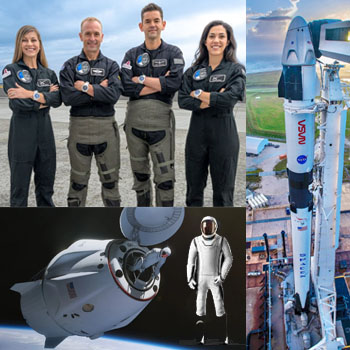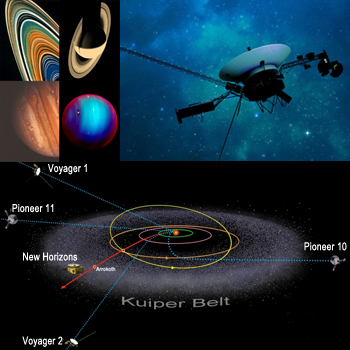SpaceX Polaris Dawn Trailblazing the Way for Humans in Space
|
MONDAY☆ Aug 26 — International Space Station, ~415-km LEO: Crew of nine from Expedition 71 and Boeing Starliner working with experiments for sleep performance, 3D printing, airflow, HAM radio, crystal growth, and auditing various tools for EVAs. ☆ Aug 26 — Tiangong Space Station, ~390-km LEO: Shenzhou 18 three-member crew maintaining botany research, along with 23 internal experiment racks; exposed / external experiments include 22 platforms on Wentian and 30 on Mengtian modules. ● Aug 26-28 — National Academies of Sciences, Engineering and Medicine, Irvine CA: Meeting: A Science Strategy for the Human Exploration of Mars. ☆ Aug 26 — Aten Asteroid (2020 RL): Near-Earth Flyby (0.02 AU) Ongoing… ☆ NET Jul — ISRO, Launch LVM-3 (Launch Vehicle Mark-3) / Gaganyaan G2, Satish Dhawan Space Center, Sriharikota, India: India planning for 1st uncrewed flight of Gaganyaan on a short orbital test flight. o Jul 1 – Aug 30 — Academia Sinica Institute of Astronomy and Astrophysics, Taipei, Taiwan: 2024 Summer Student Program; students conduct original research under supervision of professional astronomers. o Aug 24-31 — European Astrobiology Institute, University of Tartu, Stockholm University Astrobiology Centre, Tartu, Estonia: Workshop: Microsatellites and Their Use in Planetary and Astrobiology Research. |
 |
● = Terrestrial and… o = International terrestrial events
☾ = Moon activity ★ = Space and… ☆ = International space / astro events; in Hawaii Standard Time unless noted. Add 10 hours to obtain UT (‘Universal Time’). |
Weekly Planet Watch – Morning Planets: Mercury (ENE), Mars (E), Jupiter (E); Evening Planet: Venus (W).
Voyagers 1 and 2, Farthest Craft From Earth, Turn 47 During Interstellar Travel
Entering their 48th year in Space, the two Voyager spacecraft continue their missions while in Interstellar Space. Voyager 1 resumed sending readable data back to Earth from a distance of 162 AU with a one-way radio signal of ~22.5 hours, after engineers overcame a computer chip memory issue a few months ago. Currently the craft has 4 of 11 science instruments turned on and functioning. It entered Interstellar space in 2012 and launched September 5, 1977. Voyager 2 is 136 AU from Earth, working with 5 instruments, and entered Interstellar Space in 2018. The Voyagers are the longest-running and most-distant spacecraft for NASA. They are expected to have enough electrical power and thruster fuel to operate until at least 2025. Though communications would be lost by that point, Voyager 1 should come within 1.7 LY of star AC+79 3888 (Gliese 445) in the year 42013, while Voyager 2 comes within 11.7 LY (9.7 trillion miles) of the star Ross 248 (also known as HH Andromedae or Gliese 905) around the same time. (Image credits: NASA, JPL, Caltech) |
TUESDAY★ NET Aug 27 — SpaceX, Launch Falcon 9 / Polaris Dawn Crew Dragon, LC-39A, Kennedy Space Center FL: Jared Isaacman, Scott Poteet, Sarah Gillis and Anna Menon to reach apogee of 1,400 km, perform first commercial EVA, and test spacecraft-to-spacecraft communications with Starlink on 5-day mission, 03:38 EDT. ★ Aug 27 — SpaceX, Launch Falcon 9 / Starlink Group 8-10, SLC-40, Cape Canaveral SFS FL: Falcon 9 to launch next batch of Starlink v2-mini satellites; 03:13 EDT. ☾ Aug 27 — Moon: 5.6° N of Jupiter, 02:00; 5.3° N of Mars, 15:00. ☆ Aug 27 — Amor Asteroid (2024 MZ): Near-Earth Flyby (0.08 AU) WEDNESDAY☾ Aug 28 — Moon: 4.3° N of M35 cluster, 04:00. ☆ Aug 28 — Apollo Asteroid (2201 RA10): Near-Earth Flyby (0.01 AU) THURSDAY☆ Aug 29 — Galactic Energy, Ceres-1S / Payload Unannounced, Sea Launch, Haiyang Spaceport, China; 05:20 UTC. ★ Aug 29 — Blue Origin, New Shepard / NS-26, Corn Ranch, Van Horn TX; 26th suborbital flight of New Shepard carrying 6 passengers, 13:00 UTC. ● Aug 29 — NASA Advisory Council’s Human Exploration and Operations Committee (NAC-HEO), Washington DC: Meeting of NAC-HEO 2024. ☾ Aug 29 — Moon: 5.0° S of Castor, 14:00; 1.73° S of Pollux, 20:00. ☆ Aug 29 — Aten Asteroid (2012 SX49): Near-Earth Flyby (0.02 AU) |
FRIDAY
★ Aug 30 — Van Allen Probes, LEO: Spacecraft reach 12 full years / begin 13th year in space today, launched 2012; adding to the understanding of Earth radiation belt environment and its variability.
● Aug 30 — The Space Show, Online / Las Vegas NV: Dr. David Livingston hosts Sandra Hauplik-Meusburger, researcher and architect specializing in socio-spatial sustainable and compact design solutions for both terrestrial and extra-terrestrial environments.
☾ Aug 30 — Moon: 3.2° NNE of Beehive Cluster, 23:00.
☆ Aug 30 — Aten Asteroid (2016 RJ20): Near-Earth Flyby (0.05 AU)
SATURDAY
● Aug 31 — Space Renaissance, Advance Space Civilization Initiative, Euro Moon Mars, Online: Expanding Humanity To Outer Space (EHTOS) International Cooperation Youth Event, first of 2 public days ahead of September 13-15 virtual workshop.
★ NLT Aug 31 — SpaceX, LEO: Company to deorbit 100 of its older-generation Starlink satellites due to design flaw.
SUNDAY
o NET Sep — CNSA, Online / Beijing, China: International payloads for Chang’E-8 mission to be announced.
☆ Sep 1 — Deep Space: As New Horizons moves through Kuiper Belt, detecting what may be extended area beyond 50 AU, Earth-based Subaru telescope in Hawai’i aids mission by providing observations of KBOs.
☾ Sep 1 — Moon: 4.6° NNE of Mercury, 04:00; 2.66° NNE of Regulus, 19:00.
☆ Sep 1 — Uranus: 5.3° SSW of the Pleiades, 01:00.
☆ Sep 1 — Apollo Asteroid (2021 JT): Near-Earth Flyby (0.04 AU)

